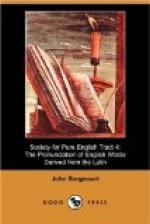In words of more than two syllables with short penultima the vowel in the stressed antepenultima was pronounced short when there was a consonant between the two last vowels, and i and y were short even when no consonant stood in that place. Examples are stamina, Sexagesima, minimum, modicum, tibia, Polybius. But u, au, eu were, as usual, exceptions, as tumulus, Aufidus, Eutychus. I believe that originally men said C[)[ae]]sarem, as they certainly said c[)[ae]]spitem and C[)[ae]]tulum, as also C[)[ae]]sarea, but here in familiar words the cases came to follow the nominative.
Exceptions to the rule were verb forms which had [=a]v, [=e]v, [=i]v, or [=o]v in the antepenultima, as am[=a]veram, defieverat, audivero, moveras, and like forms from aorists with the penultima long, as suaseram, egero, miserat, roseras, and their compounds.
This rule was among the first to break down, and about the middle of the nineteenth century the Westminster Play began to observe the true quantities in the antepenultimate syllables. Thus in spite of ‘cons[)i]deration’ boys said s[=i]dera, and in spite of ‘n[)o]minal’ they said n[^o]mina, while they still said s[)o]litus and r[)a]pidus.
On the other hand the following rule, of which borrowed words provide many examples, still obtains in the Play. In words of more than two syllables any vowel in the antepenultima other than i or y was pronounced long if no consonant divided the two following vowels. Possibly the reason was that there was a syn[ae]resis of the two vowels, but I doubt this, for a parasitic y was treated as a consonant. Examples are alias, genius, odium, junior, an[ae]mia, and on the other hand f[)i]lius, L[)y]dia. Compound verbs with a short prefix were exceptions, as [)o]beo, r[)e]creo, whence our ‘recreant’. A long prefix remained long as in d[=e]sino. The only other exception that I can remember was Ph[)o]loe.
In polysyllables the general rule was that all vowels and diphthongs before the penultima other than u, when it bore a primary or secondary stress, and au and eu were pronounced short except where the ‘alias’ rule or the ‘larva’ rule applied. Thus we said h[)e]r[)e]ditaritis, [)[ae]]qu[)a]bilitas, imb[)e]cillus, susp[)i]cionem, but fid[=u]ciarius, m[=e]diocritas, p[=a]rticipare. I do not know why the popular voice now gives [)A]riadne, for our forefathers said [=A]riadne as they said [=a]rea.
In very long words the alternation of stress and no-stress was insisted on. I remember a schoolmaster who took his degree at Oxford in the year 1827 reproving a boy for saying [’A]lphesib[’oe]us instead of Alphesib[’oe]us, and I suspect that Wordsworth meant no inverted stress in




